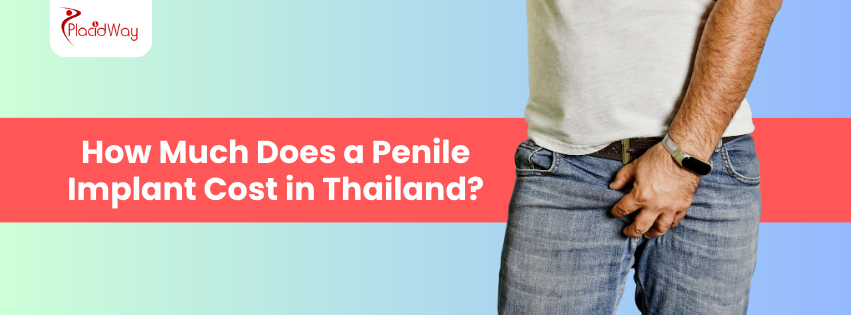Why Are Men Choosing Thailand for Penile Implant Surgery?

Penile implants are a surgical solution for men experiencing erectile dysfunction (ED) that has not responded to other treatments, such as medication or lifestyle changes. In Thailand, penile implant surgery has become a popular option due to the country’s advanced healthcare facilities, skilled urologists, and affordable prices. This guide provides an overview of penile implants, the types available, the procedure, and what patients can expect before, during, and after surgery.
What are Penile Implants?
Penile implants, or penile prostheses, are medical devices surgically placed inside the penis to allow men with ED to achieve and maintain an erection. These devices are generally considered when other treatments have proven ineffective or unsuitable.
Types of Penile Implants
There are two main types of penile implants, each with its own advantages and disadvantages:
1. Inflatable Implants
Inflatable implants are the most common type, offering the most natural feel and function. This type consists of a pair of cylinders placed inside the penis, a pump placed in the scrotum, and a reservoir containing fluid that is implanted in the lower abdomen. The pump allows fluid to be transferred to the cylinders, creating an erection. After intercourse, the fluid is released back into the reservoir.
- Two-piece inflatable implants: These combine the pump and reservoir, making them simpler and requiring less invasive surgery.
- Three-piece inflatable implants: This type has a separate pump, reservoir, and cylinders, providing the firmest erection but requiring a slightly more complex surgical procedure.
Pros: Inflatable implants provide control over when and how long an erection lasts and have a more natural appearance and feel when not in use.
Cons: The mechanical components may require maintenance or repair over time.
2. Malleable (Semi-Rigid) Implants
Malleable implants consist of bendable rods placed inside the penis. They allow the penis to be manually adjusted for intercourse and then positioned downward afterward.
Pros: Malleable implants are simple to use, with no mechanical parts that could malfunction.
Cons: The penis remains in a semi-rigid state, which may cause some discomfort and limit discreetness.
Who is a Candidate for Penile Implants?
Penile implants are often considered a last resort after other treatments for ED have failed. Candidates for this surgery include:
- Men with severe, chronic ED unresponsive to medication or other treatments.
- Those for whom ED medications have caused adverse side effects.
- Men with certain medical conditions, such as Peyronie’s disease or diabetes, that impact erectile function.
- Patients looking for a long-term solution to ED without relying on ongoing medications.
It’s essential to have a comprehensive evaluation with a urologist to determine the best treatment for your individual needs.
Benefits of Getting Penile Implants in Thailand
Thailand is an increasingly popular destination for medical tourism, especially for procedures like penile implants. Some of the main benefits include:
- Affordability: The cost of penile implant surgery in Thailand is significantly lower than in Western countries, without sacrificing quality.
- Experienced Surgeons: Thai urologists are highly trained, with many having international certifications and extensive experience with penile implant procedures.
- High-Quality Medical Facilities: Many Plastic Surgery Clinics in Thailand are accredited by international health organizations and equipped with state-of-the-art technology.
- Confidentiality and Privacy: Thailand offers a discreet environment for men who prefer privacy during their treatment and recovery.
The Penile Implant Procedure
Preoperative Preparation
Prior to surgery, patients undergo a comprehensive evaluation, including:
- A review of medical history and previous ED treatments.
- Physical examination, including penile anatomy assessment.
- Blood tests and other evaluations to ensure surgical readiness.
Your urologist will discuss implant options, procedure details, and potential risks or complications. It’s crucial to understand the benefits and limitations of the implant type chosen.
Surgical Procedure
Penile implant surgery is usually performed under general or spinal anesthesia. The procedure takes about 60-90 minutes and follows these general steps:
- Incision: An incision is made at the base of the penis or in the lower abdomen.
- Implant Placement: The surgeon inserts the chosen implant type into the penis. For inflatable implants, the reservoir is placed in the abdomen, and the pump is positioned in the scrotum.
- Closing the Incision: The incision is closed with dissolvable stitches, and a sterile dressing is applied.
Most patients can return home within a day or two after surgery.
Recovery and Aftercare
Initial Recovery: Swelling and discomfort are normal in the first few days following surgery. Pain medications are provided to help manage any discomfort, and patients are advised to avoid strenuous activities.
Follow-up Appointments: Follow-up visits with the urologist are essential to monitor healing and check the functionality of the implant. Inflatable implants will require training on how to use the pump properly.
Resuming Sexual Activity: Most men can resume sexual activity about 4-6 weeks after surgery, once healing is complete.
Long-Term Care: Penile implants are designed to last 10-15 years, depending on the type and care. It’s important to attend regular follow-ups to check the condition of the implant.
Risks and Complications
Like any surgical procedure, penile implant surgery carries potential risks:
- Infection: Antibiotics are usually prescribed to minimize infection risks.
- Implant Malfunction: Mechanical issues can occur, especially with inflatable implants, but repairs or replacements are possible.
- Erosion or Migration: Rarely, the implant may erode through the skin or shift in position, requiring corrective surgery.
Proper post-operative care and regular check-ups can help prevent these complications.
Cost of Penile Implants in Thailand
The cost of penile implants in Thailand is substantially lower than in Western countries. Here is a general overview:
| Type of Penile Implant | Average Cost in Thailand | Average Cost in Western Countries |
|---|---|---|
| Two-Piece Inflatable Implant | $5,000 - $8,000 | $15,000 - $20,000 |
| Three-Piece Inflatable Implant | $6,000 - $10,000 | $20,000 - $30,000 |
| Malleable Implant | $4,000 - $7,000 | $12,000 - $18,000 |
These prices vary depending on the hospital, surgeon, and specific implant type. For the most accurate pricing, consult directly with your chosen facility.
Choosing the Right Hospital and Surgeon in Thailand
When considering penile implant surgery in Thailand, keep the following in mind:
- Hospital Accreditation: Look for hospitals accredited by international health organizations, which ensure high standards of care and safety.
- Surgeon Credentials: Verify the surgeon’s qualifications, experience with penile implants, and patient reviews.
- Comprehensive Consultation: The hospital should offer a thorough consultation to answer all questions, provide a personalized treatment plan, and discuss expected outcomes.
- Clear Communication: Effective communication with the medical team is crucial for understanding the procedure, recovery, and aftercare.
Frequently Asked Questions
1. How long does a penile implant last?
Most penile implants last between 10 to 15 years, with inflatable implants potentially lasting slightly longer than malleable types.
2. Will I still be able to achieve a natural erection?
Penile implants do not restore natural erectile function. Instead, they allow you to manually control when you have an erection, so spontaneous erections are no longer possible.
3. Is penile implant surgery painful?
Postoperative pain is generally mild to moderate and can be managed with prescribed pain relief. Discomfort usually subsides within a few weeks.
4. Are penile implants covered by insurance?
Penile implants are usually considered elective, so they may not be covered by insurance. However, some policies may provide partial coverage for specific medical conditions; check with your provider for details.
5. Can penile implants be removed?
Yes, penile implants can be removed or replaced if necessary, although removal may cause some changes in penile tissue and erectile function.
Get Started with PlacidWay
If you’re considering penile implant surgery, Thailand offers experienced surgeons, advanced facilities, and affordability. Contact PlacidWay today to learn more about penile implant options, consult with specialists, and get answers to any questions you may have. Take the first step toward reclaiming confidence and a fulfilling intimate life.










.png)
.png)


